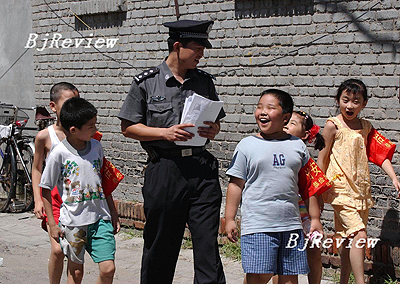|

February 6, the Chinese Lunar New Year's Eve. A police dog on duty at Beijing Dongzhimen subway station suddenly barks at a male passenger, who is then checked and found to be carrying a small number of prohibited fireworks.
Similar scenes have taken place across Beijing at subway stations taking part in a pilot security check program that began on February 3. The security check includes hand searches, machine checks and dog checks. It will spread to the whole Beijing subway line before the opening ceremony of the Olympics.
"The security of Olympics must rely on the overall security operation in the host city," said Ma Zhenchuan, Director General of Beijing Municipal Public Security Bureau and Commander in Chief of the Security Command Center for the Games of the XXIX Olympiad.
In early 2004, drawing on the international antiterrorism grading system and using crime statistics spanning the last three years, Beijing Municipal Public Security Bureau created a grading system ranging from safe to unsafe for city security.
"We will weave a large security net that covers every corner of the city 24 hours a day," said Ma. "This is the most important step to ensure the security of the Olympics."
The large safety net he mentioned is made up of four separate nets: a patrol net that focuses on the main streets and key bustling areas; a community net that deals with the security of specific communities; a protective and control net that connects the interior security system of crucial enterprises; and a security net that covers all the other fields that are not included in the former three nets.
Beijing's police forces will be supplemented by volunteers to help ensure citywide security during the Olympics.
Hein Verbruggen, Chairman of the International Olympic Committee's Coordination Commission for the Beijing Games, gave a thumbs-up to the security net of the Beijing police. "As well as fighting against crime, it pays attention to protecting against and controlling crime," he said.
The reaction time of Beijing's police force has been improved significantly in the run-up to the Olympics. Their average reaction speed to a 110 call is now 4.5 minutes.
This may have been a contributing factor in a 5.9-percent drop in crime last year compared with the previous year. The number of criminal cases solved and suspects arrested has also increased year on year. Last year, the number of homicide case solved in Beijing surpassed 90 percent for the first time, the highest in 22 years.
Beijing Municipal Public Security Bureau has employed more than 70 experts and consultants from China and abroad to look at the city's Olympic security and conduct extensive international coordination. "We've strengthened the cooperation with security institutions in countries and regions that have hosted the Olympics before, and conducted regular exchanges with other international security assurance organizations. We also arrange regular meetings with security officials in every embassy in China," said Liu Jingmin, Vice Mayor of Beijing and Executive Vice President of the Beijing Organizing Committee for the Games of the XXIX Olympiad.
The security authorities in Beijing are conducting public security education. Vigilance by ordinary members of the public will help to supplement Beijing's 150,000-strong professional security force and more than 290,000 volunteers.
"Communities are cells of a city. Only when every cell is safe can Beijing be totally safe," said Liu Yabin, a policeman in Maizidian Community, Chaoyang District. His daily work involves patrolling in the community, saying hello to residents, and paying attention to strangers. He once saved a girl who wanted to commit suicide and has prevented many criminal activities in the community.
There are altogether more than 3,300 community police officers like Liu in Beijing, making it the city with the strongest community police force of China. For 249 communities with Olympic venues built in them and 389 communities with specific safety problems, each is allocated with additional police officers.
The buildings in many communities have been installed with security doors and the old wooden doors of Beijing's quadrangles have been replaced with magnetic security doors.
Beijing's police officers are familiar with the idea "only when our service spreads to every corner of the society can we remove more and more hidden troubles, and the security net will become more solid."
"Our work should be people-oriented," said Ma. "Taking burglary for example: only when the amount of money stolen surpasses 500 yuan ($69.44) can it be set as a criminal case, but even the loss of 1 yuan ($0.14) will cause a sense of danger for people. So as long as people call the police, no matter how much money is involved, we will take action as soon as possible." | 